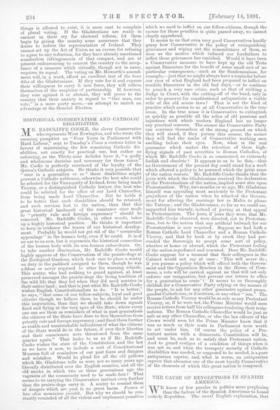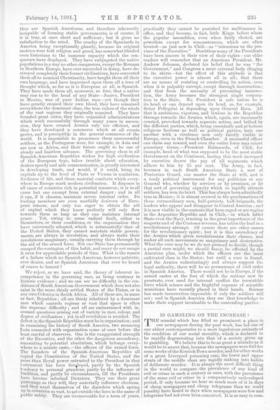THE CAUSE OF REVOLUTIONS IN SPANISH AMERICA.
WE know of few puzzles in politics more perplexing than the failure of the Spanish Americans to found orderly Republics. The usual English explanation, that they are Spanish Americans, and therefore inherently incapable of forming stable governments, is of course, if it is true, at once short and sufficient ; but it gives no satisfaction to the mind. The cruelty of the Spaniards in America being exceptionally ghastly, because its original motives were both religion and greed, has somewhat blinded even historians to the immense capacity which the con- querors have displayed. They have subjugated the native populations in a way no other conquerors, except the Romans in Southern Europe, have ever succeeded in doing, have de- stroyed completely their former civilisations, have converted them all to nominal Christianity, have taught them all their own language, and have impressed upon them all a tone of thought which, so far as it is European at all, is Spanish. They have made them all, moreover, so free, that a native may rise to be the head of any State—Juarez, President in Mexico, was of pure Indian race—yet though they have greatly crossed their own blood, they have remained everywhere the dominant class, the true rulers of the whole of the vast regions they originally acquired. They have founded great cities, they have organised administrations which work successfully through many years in succes- sion, they have created Armies only too efficient, and they have developed a commerce which at all events grows, and is perceptible in the general commerce of the world. It is impossible to pronounce them unsuccessful settlers, as the Portuguese were, for example, in Asia and are now in Africa, and their future ought to be one of steady and limitless advance. The governing class in all Spanish-American Republics wishes for high civilisation of the European type, takes trouble about education, desires speedy and safe communication, is greatly interested in developing trade, and would, if it could, bring its capitals up to the level of Paris or Vienna in sanitation, liveliness of life, and those material comforts which every- where in Europe mark modern civilisation. It disposes in all cases of countries rich in potential resources ; it is in all cases but one exempt from external danger ; and in all it can, if it chooses, maintain severe internal order. Its leading members are even morbidly desirous of Euro- pean esteem, and only too eager to obtain the aid of capital which they know perfectly will only flow towards them so long as they can maintain internal peace. Yet, owing to some radical fault, either in themselves, or their conditions, or the organisation they have universally adopted, which is substantially- that of the United States, they cannot maintain stable govern- ments, are always in revolution, and always make their revolutions sanguinary, usually carrying them through by the aid of the armed force. Not one State has permanently escaped the contagion of this habit, and many do not escape it even for appreciable periods of time. What is the reason of a failure which no Spanish American, however patriotic, ever denies, and no Spanish American that ever we heard of ceases to lament ?
We reject, as we have said, the theory of inherent in- competence in the governing race, as being contrary to historic evidence ; and we can see no difficulty in the con- ditions of South American Government which does not also exist in the more thinly settled States of the Union, or in our own Colonies in South Africa. All of these are, in name or fact, Republics ; all are thinly inhabited by a dominant race which controls regions so vast that space is often the supreme difficulty ; and all are embarrassed with in- cessant questions arising out of variety in race, colour, and degree of civilisation ; yet in all revolution is avoided. The defect in the Spanish Republics must be in organisation; and in examining the history of South America, two menacing facts connected with organisation come at once before the least careful of observers. One is the exaggerated strength of the Executive, and the other the dangerous ascendency, amounting to potential absolutism, which belongs every- where, to a minute caste,—the officers of the armed force, The founders of the Spanish-American Republics all copied the Constitution of the United States, and the more than Royal power entrusted to the President in that instrument has been devgloped, partly by the Spanish tendency to personal grandeur, partly by the influence of tradition, and partly by circumstances, till the Presidents have become informal Dictators. They use their great patronage as they will, they materially influence elections, and they avail themselves of the disorders which spring up in countries so vast, to act outside the laws in the name of public safety. They are irremoveable for a term of years, practically they cannot be punished for malfeasance in office, and they become, in fact, little Kings before whom the popular assemblies, even when fairly elected, are powerless except for remonstrances, which are often treated—as just now in Chili—as " intrusions on the pro- vince of the Executive." Doubtless many of the Presidents have been sincere in their view of their rights—our older readers will remember that an American President, Mr. Andrew Johnson, declared his belief that he was " the Government," and Congress a mere external body clinging to its skirts—but the effect of this attitude is that the executive power is almost all in all; that there are no means of resisting or controlling its action, even when it is palpably corrupt, except through insurrection; and that from the necessity of preventing insurrec- tion, the Army becomes the strongest single corpora- tion in the State. No President is safe unless he is its head, or can depend upon its head, as, for example, Sefior Pellegrini is depending upon General Roca. All that is ambitious, vigorous, and lawless in the Republics throngs towards the Armies, which, again, are incessantly courted, provoked towards separate action, and bribed by the different parties, which, being essentially and at bottom religious factions as well as political parties, hate one another with a virulence now only faintly visible in Europe, even in the French Chamber. A successful officer can claim any reward, and even the entire force may extort pecuniary terms,—President Balmaceda, of Chili, for example, head of what was supposed to be the most stable Government on the Continent, having this week increased by executive decree the pay of all regiments which adhere to him by 25 per cent. The Army, in fact, becomes in each South American State a sort of Praetorian Guard, can master the State at will, and is a ready political instrument for any politician or any General who, whether by services or by promises, or by that sort of governing capacity which so rapidly attracts soldiers, has won its heart. This has always been admittedly true in Mexico ; it is almost avowed in the proclamations of those extraordinary men, half-patriots, half-brigands, the leaders who appear and disappear in Central America ; and it is now visible in the contests that have raged or are raging in the Argentine Republic and in Chili,—in which latter State even the Navy, trusting in the great importance of the seaports and of the Customs revenue, has taken the load in a revolutionary attempt. Of course there are other causes for the revolutionary spirit ; but it is this ascendency of the Armies which gives revolutionists their chance, and makes all such movements so sanguinary and destructive. What the cure may be we do not pretend to decide, though a partial cure might, we should fancy, be effected by the American plan, under which the officers are the most cultivated class in the States ; but until a cure is found, and the Armies unhesitatingly and always support the legal authority, there will be no permanence of civil order in Spanish America. There would not be in Europe, if the armed castes at the feet of which the nations now lie prostrate, over used for internal conflict the irresistible force which science and the frightful expense of scientific munitions have recently placed in their hands. Science has made insurrection impossible if only the soldiers will act ; and in Spanish America they use that knowledge to make their support invaluable to the contending parties.



































 Previous page
Previous page